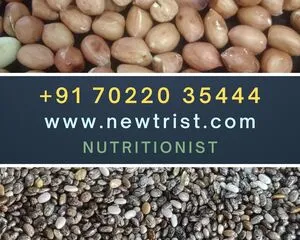Newtrist Nutritionist lung cancer diet includes high-calorie complex carbohydrates, protein-dense foods, and carbohydrates that support the cells of the body. The diet of a lung cancer patient should contain fruits, vegetables, whole grains, healthy fats from avocados, olive oil, nuts, and eggs, lean meat, and fish to improve respiratory health.
- Early morning drink @ 6:30 am: Kiwi Juice
- Breakfast @ 9 am: Oats Upma with Vegetables (Broccoli, Carrot)
- Mid-morning meal @11am: Green Tea with Apple slices
- Lunch @ 1 pm: Brown Rice with Soya curry and Buttermilk
- Evening Snack @ 4 pm: Dry nuts mixture
- Dinner @ 7 pm: Broccoli paratha with Grilled fish
- Bedtime @ 8 pm: Turmeric Milk
Consult 19 years experienced Chief Nutritionist Vasanthi for expert advice and a personalized diet plan. In-person consultation at HSR, Koramangala, Bellandur, Haralur, and video consultation across India.
- Consultation INR 750
- 1 Week personalized diet plan INR 2000
- 1 Month personalized diet plan INR 4000
- 3 Months personalized diet plan INR 9000

Table of Contents
What is Lung Cancer?
Lungs are spongy structures found in the chest that takes in oxygen and expels carbon dioxide from the body. The presence of abnormal cells and tissues in the lungs indicates the presence of lung cancer. Lung cancer may start in the airways of your lungs or start in other places and move to the lungs. People who are chain smokers are at great risk of lung cancer. Quitting smoking may reduce the risk of lung cancer.
Lung cancer does not show any symptoms during its early stages. However, the disease may reveal a few indications as the disease progresses. Some of the lung cancer symptoms are
- Fever
- Headache
- Chest pain
- Shortness of breath
- Persistent cough
- Presence of blood while coughing
- Unexpected weight loss
- Hoarseness.
Non-smokers may also face the risk of lung cancer. When the lungs are exposed to cigarette smoke for a long period, it damages the cells that line the lungs. The body may repair the damage in the beginning but the cells react abnormally and develop into cancer with consistent exposure.
Previous radiation treatment of the chest increases the risk of lung cancer. Exposure to radon gas which is produced due to the natural breakdown of uranium in the soil, rock, and water, and exposure to asbestos, chromium, nickel, and arsenic affects the health of the lungs which increases the chances of developing lung cancer.
What are the types of Lung Cancer?
The two types of lung cancer are
- Small Cell Lung Cancer (SCLC)
- Non-small Cell Lung Cancer (NSCLC)
Small Cell Lung Cancer (SCLC)
Small-cell lung cancer is seen in heavy smokers. The rapid growth of cancer cells is seen in this type of cancer and is difficult to treat. It is a small lung tumor that has already spread to nearby places/organs. Persistent cough, chest pain, and trouble breathing are some of the signs of small-cell lung cancer. This type of cancer responds well to chemotherapies and radiation treatments. The types of small-cell lung cancer are
- Small cell carcinoma (Oat cell carcinoma)
- Combined small cell carcinoma
Non-Small Cell Lung Cancer (NSCLC)
Non-small cell lung cancer is the most common type of lung cancer found in 80% of lung cancer patients. The types of non-small cell lung carcinoma are
- Adenocarcinoma
- Squamous cell carcinoma
Adenocarcinoma affects the cells in the outermost layer of the lungs. This type of tumor is found in the alveoli which is a balloon-like structure that pumps air in and out of the lungs.
Adenocarcinoma in Situ is found on the innermost layer of the lungs that secrete body fluids like mucus and digestive enzymes.
Squamous Cell Carcinoma is seen in squamous cells that line the inner layer of the airways of the lungs. It is found in the center part of the lungs near the bronchus and is common among smokers.
Diet chart for lung cancer patient
- Early morning drink @ 6:30 am: Green tea with soaked nuts
- Breakfast @ 9 am: Carrot paratha with Greek yogurt
- Mid-morning meal @ 11 am: Mixed fruit salad sprinkled with roasted flax seeds
- Lunch @ 1 pm: Grilled Mushrooms with Brown/white rice
- Evening snack @ 4 pm: Roasted channa
- Dinner @ 7 pm: Methi jowar chilla with chutney (onion, garlic)

Lung cancer foods to avoid
Lung cancer foods to avoid are
- Sugary foods
- Raw sprouts
- Red meats
- Processed meats
- Raw/half-cooked fish
- Cold-cut meats
- Unpasteurized dairy products
- Fried foods
- Refined foods
- Salty foods
- Chocolates
- Caffeinated beverages
Treatment of lung cancer can cause nausea, diarrhea, and other symptoms which can be aggravated by the intake of foods high in saturated fats and fried ones. It is also advised to limit the intake of raw fish in the forms of sushi, raw sprouts, unwashed fresh leafy greens, raw honey, unpasteurized dairy, and juices as these foods may contain salmonella and other harmful bacteria.
Consumption of dairy products could increase phlegm and mucus production which can aggravate coughing and wheezing in lung cancer patients. Intake of high-sodium foods causes fluid retention and shortness of breath. Avoid fast foods and packaged foods that contain too much salt and opt for healthy homemade food for improved lung health.
Food for lung cancer patients
Food for lung cancer patients includes
- High-quality protein foods
- Complex carbohydrates
- Healthy fats
- Potassium-rich foods
- Fresh fruits and vegetables
Protein-rich sources
- Lean meat
- Fish
- Eggs
- Beans
- Legumes
- Soy products
- Nuts
- Seeds
Sources of Complex carbohydrates
- Whole wheat
- Oats
- Quinoa
- Millet
- Pulses
Sources of healthy fats
- Fish such as Salmon, Sardines, Mackerel, Anchovies, and Cod
- Nuts such as almonds, walnuts, cashews, and pistachios
- Seeds such as pumpkin seeds, sunflower seeds, chia seeds, and flaxseeds
- Avocados
- Olive oil
Potassium-rich foods
- Leafy greens
- Bananas
- Spinach
- Broccoli
- Beetroot
- Tomatoes
- Potatoes
- Avocados
- Oranges
- Soy foods
- Almonds
Diet for lung cancer stage 4
Stage 4 lung cancer, also called “Metastatic lung cancer” is a non-small cell lung cancer that has been spread to distant organs and other parts of the body such as the heart, lymph nodes, pericardium, and other areas. This is an advanced stage that is unrecoverable.
Although patients with stage 4 lung cancer may not survive for a long period, providing them with healthy foods can make them feel better and overcome the side effects of treatment.
- Early morning drink @ 6:30 am: Amla Juice
- Breakfast @ 9 am: Egg paratha with cucumber salad
- Mid-morning meal @ 11 am: Boiled moong sprouts
- Lunch @ 1 pm: Brown rice with lauki dal + soya chunks cooked with carrot
- Evening snack @ 4 pm: Roasted nuts
- Dinner @ 7 pm: Multigrain Roti with kidney beans curry

Diet after lung cancer surgery
Diet after lung cancer surgery includes protein-rich foods such as eggs, chicken, fish, and low-fat dairy products. A normal diet free from processed and fatty foods can help you recover after the surgery. Eat bland and non-spicy foods if you face stomach upset as the bowel movements may not be back to normal.
Include bright-colored fruits and vegetables on the menu. Add more fiber to your plate and eliminate the use of refined foods. Try adding turmeric, cinnamon, ginger, and garlic to the dishes as these foods are anti-inflammatory and contain antioxidant properties that speed up the recovery.
- Early morning drink @ 6:30 am: Orange juice
- Breakfast @ 9 am: Jowar Roti with grated Carrot and Methi + 2 boiled eggs
- Mid-morning meal @ 11 am: Pumpkin soup
- Lunch @ 1 pm: Chicken Salad, vegetable pulav + Cucumber
- Evening snack @ 4 pm: Roasted Makhana
- Dinner @ 7 pm: Millet upma with turmeric and vegetables

Small cell lung cancer diet
- Early morning drink @ 6:30 am: Warm lemon water with honey
- Breakfast @ 9 am: Oats rava idli with sambar
- Mid-morning meal @ 11 am: Corn salad
- Lunch @ 1 pm: Brown rice with rajma curry and steamed beetroot salad
- Evening snack @ 4 pm: Banana-Walnut smoothie
- Dinner @ 7 pm: Cauliflower paratha with low-fat curd

Metastatic lung cancer diet
Metastatic cancer refers to when the cancer has begun to spread from the point of origin to other parts of the body. Frequent visit to the hospital is required to analyze the symptoms and find treatment to improve the symptoms.
The metastatic lung cancer diet consists of protein-rich foods such as beans, legumes, soy foods, millet, and whole grains.
- Early morning drink @ 6:30 am: Cinnamon tea
- Breakfast @ 9 am: Multigrain roti with scrambled tofu bhurji
- Mid-morning meal @ 11 am: Avocado-cucumber salad
- Lunch @ 1 pm: Brown Rice with moong dal and stir-fried ivy gourd
- Evening snack @ 4 pm: Kale channa sundal
- Dinner @ 7 pm: Quinoa pulav with leafy greens

Low sodium lung cancer
Hyponatremia (low sodium levels) is a common symptom in lung cancer patients. Hyponatremia may be caused due to incidental medications which may delay the chemotherapy treatments. It is advised to limit the salt intake if fluid retention is a main complaint during the treatment.
Consumption of fresh fruits, vegetables, unprocessed grains, organic meats, and fresh fish helps in managing the salt intake for lung cancer. Avoid consuming fast foods, noodles, cured meats, and restaurant foods, and prefer healthy home-cooked foods.
Keto diet for lung cancer
The keto diet is effective in the treatment of lung cancer where the cancer cells use ketone bodies as the main source of energy. This results in the atopsis of cancer cells. A ketogenic diet shows a significant decrease in tumor size and increases the survival rate of lung cancer patients. The ketogenic diet is safe for most people but it needs the guidance of an expert nutritionist to manage its side effects such as fatigue, constipation, and headache.
- Early morning drink @ 6:30 am: Green smoothie
- Breakfast @ 9 am: Egg, tomato, basil, and spinach omelet
- Mid-morning meal @ 11 am: Avocado fruit
- Lunch @ 1 pm: Chicken salad with olive oil, feta cheese, and grilled broccoli
- Evening snack @ 4 pm: Whole milk yogurt with peanut butter
- Dinner @ 7 pm: Grilled Salmon with bell pepper and green veggies

Best fruits for lung cancer
The best fruits for lung cancer are
- Apples
- Bananas
- Oranges
- Amla
- Kiwi
- Avocados
- Grapefruit
- Pomegranates
- Lemons
- Pears
- Berries
- Cherries
Fruits are excellent choices that slow tumor growth and help in managing the side effects of cancer treatment. Fruits are loaded with antioxidants, fiber, essential vitamins, and minerals that combat the symptoms of chemotherapy such as fatigue, anemia, nausea, diarrhea, constipation, and other symptoms.
Fruits aid in adequate hydration throughout the cancer treatment. Citrus fruits, especially oranges, lemons, kiwi, and grapefruit are loaded with vitamin C which reduces the growth and spread of cancer cells. Vitamin C strengthens the immune system and boosts the absorption of iron in the body.
Lung cancer prevention diet
- Early morning drink @ 6:30 am: Decaf coffee
- Breakfast @ 9 am: Vegetable stuffed idli with chutney
- Mid-morning meal @ 11 am: Turmeric-tomato soup
- Lunch @ 1 pm: Chicken fried rice with grilled paneer
- Evening snack @ 4 pm: Egg omelet with veggies
- Dinner @ 7 pm: Multigrain roti with channa curry

Lung Cancer FAQs
What foods to avoid with lung cancer?
Refined foods, sugary desserts, and beverages, red meat, processed meat, chocolates, deep-fried foods, raw or half-cooked seafood, raw sprouts, packaged foods, and unpasteurized dairy products are some of the foods to avoid with lung cancer.
Foods high in saturated fats and trans fats and exposure to smoke and chemical carcinogens are the root cause of lung cancer.
What foods prevent lung cancer?
Intake of healthy foods like fruits, vegetables, and whole grains which are rich in antioxidants and contain anti-cancerous properties. Foods like turmeric, tomatoes, garlic, onions, carrots, broccoli, spinach, peas, bell peppers, leafy greens, apples, oranges, berries, and vitamin C-rich foods reduce the risk of developing lung cancer.
The antioxidant properties of these foods waves off the damage caused by the free radicals.
Why does small cell lung cancer cause SIADH?
SIADH is caused due to the ectopic production of anti-diuretic hormones by the tumor cells. Small cell lung cancer is capable of producing peptide hormones among which the arginine vasopressin (AVP) is the most frequent.